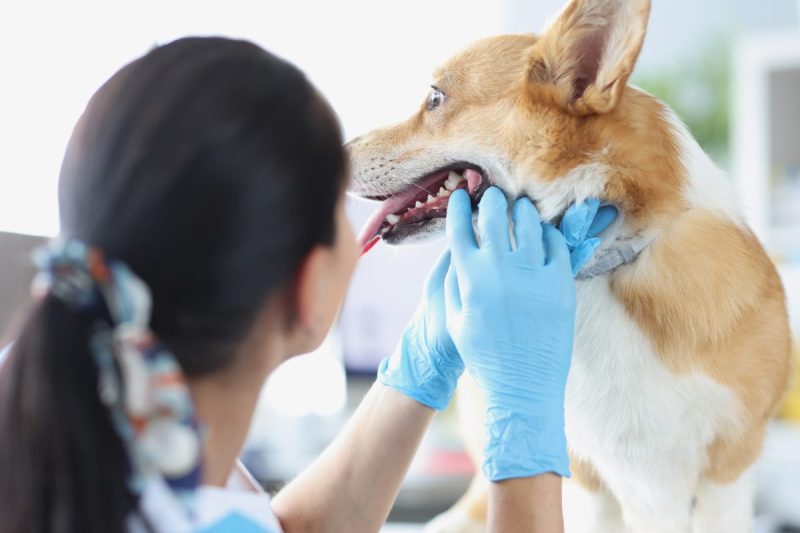Stomatitis in dogs is an inflammation of the gums and mucous membranes in the mouth, which can include the tongue, inner lips, and the roof and floor of the mouth. This inflammation can be due to allergies, exposure to medication, infection, or several other factors.
If you see the signs in your dog, consult your veterinarian so they can form a diagnosis and prescribe treatment. Here’s what you should know about the symptoms, causes, and treatments for stomatitis in dogs.
Symptoms Of Stomatitis In Dogs
The symptoms of stomatitis in dogs have some similarities to symptoms of gingivitis, though stomatitis is a more generalized inflammation that can apply to other areas of the mouth, not just the gums, and is usually more severe.
These symptoms may be difficult to spot because dogs suffering from stomatitis are often in pain and resist having their mouths examined. It’s important that you do your best to check your dog’s oral health so you can tell if something is wrong.
Here are some signs that dogs may be suffering from stomatitis:
- Bleeding gums
- Blood visible in saliva
- Difficulty or signs of pain while eating (whining, yelping, etc.)
- Excessive drooling
- Bad breath
- Visible plaque on the teeth
- Swollen, red, inflamed gums
- Lesions on the gums or elsewhere in the mouth
- Pawing at the mouth
- Difficulty self-grooming
- Poor coat appearance
- Loss of appetite
- Weight loss
Causes of stomatitis in dogs
There are many medical conditions and factors that can lead to stomatitis in dogs. It is rarely a primary condition, so there’s usually an underlying condition or illness. For puppies, inflammation can result from teeth getting overcrowded in the mouth.
Stomatitis can result in painful swelling and lesions in dogs’ mouths, making it hard for them to groom or eat. The condition is often difficult to treat, and teeth may need to be removed to reduce pain and symptoms.
Inflammation, in general, is caused by an overreaction of the immune system to an irritant, infection, or injury. Many conditions can cause inflammation within the mouth, which leads to pain and symptoms, which is why you should consult a vet as soon as you notice any signs of inflammation.
Here are some of the conditions that can cause stomatitis in dogs:
- Diabetes
- Allergic response (usually to biofilm or plaque on the teeth, or even the teeth themselves)
- Contact with caustic substances
- Autoimmune disorders
- Bacterial, parasitic, or fungal infections
- Reaction to certain medications
- Lymphoma
- Hormonal deficiencies
- Renal (kidney) disease
- Osteomyelitis
- Hypereosinophilic syndrome
Although any breed can develop stomatitis, certain breeds have predispositions to medical conditions that often include stomatitis as a secondary condition.
Osteomyelitis, for example, is more common in the Greyhound, Labrador Retriever, Maltese, and Miniature Schnauzer dog breeds.
Treatments of stomatitis in dogs
Treatment of stomatitis in dogs is often difficult, though sometimes the condition can clear up on its own once the underlying causes are removed. This can happen with a temporary infection or exposure to caustic chemicals, for example.
Although veterinarians will try to save the teeth, they often have to remove teeth to reduce symptoms of pain and improve quality of life for dogs’ who suffer from stomatitis. Antibiotics may help fight bacterial infection and reduce some symptoms, and they usually help after teeth extractions to prevent further infections. They can be effective in reducing inflammation and providing some relief, though this is not always the case.
Daily dental hygiene and regular professional cleanings can slow the progression of stomatitis, but this is often not enough to prevent painful symptoms. Immunosuppressants can reduce inflammation associated with stomatitis, though they do have side effects, and the risk of experiencing side effects increases with long-term use, meaning this might not be a practical permanent solution.
Steroids may also provide short-term relief, but they become less effective over time and also have side effects, such as leaving dogs open to more infections or diabetes.
Teeth extraction is usually a permanent, effective solution, and most dogs can go on living just fine after the procedure. Dogs who have teeth removed may need to have a soft food diet, as they aren’t able to chew as well.
Professional dental cleanings and at-home care should continue throughout dogs’ lives to prevent further oral illness and inflammation.

